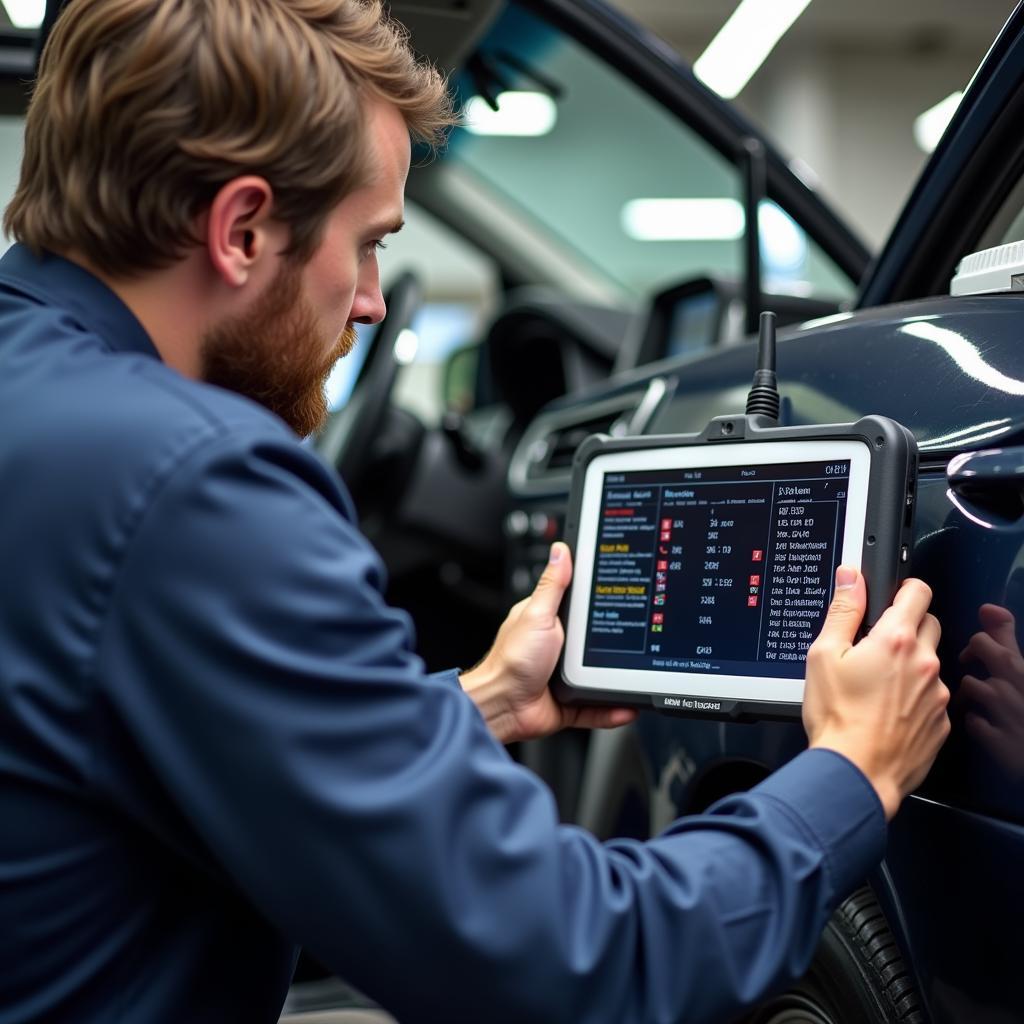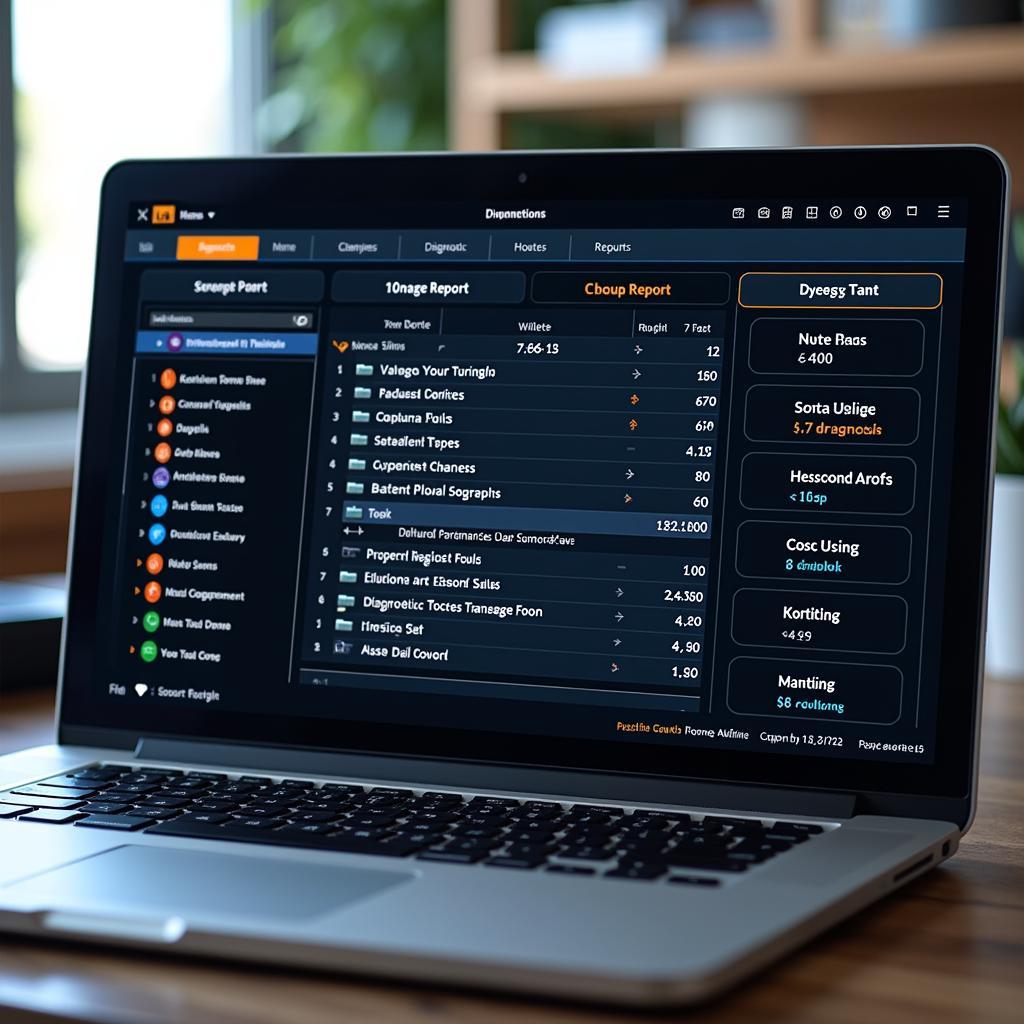So, your car’s acting up, that pesky check engine light is glaring, and you’re wondering, “Who Can Run A Diagnostic On My Car?” You’re not alone! Car troubles are stressful, but understanding your options for diagnostics can save you time, money, and a whole lot of worry.
Unraveling the Mystery: What Exactly Does a Car Diagnostic Involve?
Before we delve into the ‘who,’ let’s quickly clarify the ‘what.’ A car diagnostic isn’t some mystical ritual performed under the hood. It simply means tapping into your car’s computer system, reading the Diagnostic Trouble Codes (DTCs) stored there, and deciphering what those codes mean for your car’s health. These codes act like clues, pointing towards potential issues like faulty sensors, emissions problems, or even transmission hiccups.
 Car Diagnostic Tools
Car Diagnostic Tools
The Usual Suspects: Where Can I Get My Car Diagnosed?
When it comes to getting a car diagnostic, you have a few avenues:
-
Dealerships: Your car’s dealership might seem like the obvious choice, and they certainly have specialized knowledge of your car’s make and model. However, dealership diagnostics can be pricey, and sometimes they recommend unnecessary repairs.
-
Independent Mechanics: Local mechanics often offer more affordable diagnostic services than dealerships. Look for well-established shops with a good reputation and mechanics certified by the National Institute for Automotive Service Excellence (ASE).
-
Auto Parts Stores: Many chain auto parts stores, like AutoZone or Advance Auto Parts, offer free basic diagnostic scans. Keep in mind these scans might not be as comprehensive as those performed by a mechanic.
-
DIY Diagnostics: Feeling tech-savvy? You can purchase your own OBD-II scanner and run the diagnostics yourself. There are plenty of affordable options available online and at auto parts stores.
 Mechanic Running Car Diagnostics
Mechanic Running Car Diagnostics
DIY or Delegate? Choosing the Right Diagnostic Route for You
So, you’ve got options. But how do you decide which route is best for you? Consider these factors:
- Complexity of the Issue: For a simple check engine light with no other noticeable symptoms, a basic scan at an auto parts store or a DIY approach might suffice. However, if your car’s exhibiting serious symptoms like stalling, strange noises, or warning lights galore, it’s best to consult a professional mechanic.
- Your Budget: DIY diagnostics are the most budget-friendly, while dealerships tend to be the priciest.
- Your Comfort Level: If you enjoy tinkering with your car and learning new things, DIY diagnostics can be empowering. But if you’d rather leave it to the pros, that’s perfectly okay too. What can stop a diagnostic with your car? Find out more about potential issues.
“I Can Do It Myself!” Navigating the World of DIY Car Diagnostics
Ready to roll up your sleeves and become your own car doctor? Here’s a quick rundown:
-
Get Equipped: Purchase an OBD-II scanner. These handy devices plug into your car’s OBD-II port (usually located under the dashboard on the driver’s side) and communicate with your car’s computer.
-
Connect and Scan: Turn your car’s ignition to the “on” position (without starting the engine), connect the scanner, and follow the on-screen prompts to initiate the scan.
-
Decode the Mystery: The scanner will display the DTCs stored in your car’s computer. Now the real detective work begins! Look up the codes online or in your car’s repair manual to understand what they mean.
-
Proceed with Caution: While DIY diagnostics can be helpful, remember they only provide a starting point. Misinterpreting codes or attempting complex repairs without proper knowledge can lead to further damage and costly mistakes. If in doubt, consult a trusted mechanic. What does car diagnostic consist of? Learn more here.
A Word from the Wise: Expert Insights on Car Diagnostics
“Don’t underestimate the importance of regular car diagnostics,” advises Master Mechanic, John Smith, from Smith’s Auto Repair. “Just like regular check-ups with your doctor, proactive car diagnostics can identify minor issues before they snowball into major (and expensive!) problems.”
 Car Diagnostic Report
Car Diagnostic Report
Car Diagnostics: Your Ticket to a Smooth Ride
No matter which route you choose – DIY, mechanic, or dealership – remember that car diagnostics are your ally in keeping your car running smoothly. By understanding the ‘who,’ ‘what,’ and ‘why’ of car diagnostics, you’ll be equipped to make informed decisions about your car’s health and keep those surprise breakdowns at bay.
FAQs
1. How often should I get my car diagnosed?
It’s generally recommended to get your car diagnosed at least once a year, or sooner if you notice any unusual symptoms.
2. Can I drive my car with the check engine light on?
While you might be able to drive for a short distance, it’s crucial to get the issue diagnosed as soon as possible. Ignoring the check engine light can lead to more severe damage.
3. Will clearing the codes fix the problem?
Clearing the codes only erases the stored information. It doesn’t address the underlying issue. It’s essential to diagnose and repair the root cause of the problem to prevent it from recurring. Can I run diagnostics on my car? Get more insights here.
4. What is the cheapest diagnostic car reader for the Koleos?
What is the cheapest diagnostic car reader for the Koleos? Find out here.
5. What does a car diagnostic tell you?
What does a car diagnostic tell you? Learn more here.
Have other car related questions? Feel free to reach out to us on WhatsApp: +1(641)206-8880 or shoot us an email at [email protected]. Our dedicated team is available 24/7 to assist you!

Leave a Reply